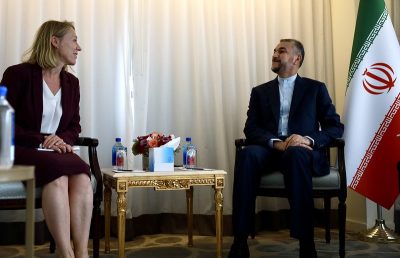The president of the Norwegian Parliament, whose family came to Norway as refugees from Iran, has set off a diplomatic incident after publicly protesting the death of a 22-year-old Iranian woman while in police custody in Teheran. Iranian officials responded by calling Norway’s ambassador to Iran in on the carpet.

Masud Gharahkhani, introducing himself in a video posted on Twitter as the Norwegian Parliament’s president, could speak directly to Iranian demonstrators in their own language. He noted how he’d been born three years after the Islamic revolution in Iran and was five when his family sought refuge in Norway.
The revolution, he noted, “was supposed to give people democracy, freedom and human rights.” Iranian authorities, he said, were “supposed to use oil money to develop society. But 43 years later, what’s happened in practice? No democracy, no freedom, no human rights, no established society. And what’s the result? Mahsa Amini (who was arrested by so-called “morality police” for allegedly not covering all of her hair) and all of the others who’ve been killed over the years. My heart aches, it makes me sick, I’m angry.”
He was reacting strongly to the death of the young Iranian woman, as are hundreds of thousands of others all over the world and not least in Iran itself. Demonstrations have also been held in Norwegian cities (Mahsa Amini’s aunt and cousins live outside Bergen) to protest police brutality and how women are treated in Iran.
“I know that young people are crying out for freedom and democracy in the streets,” said Gharahkhani in his video. “I hope these young people achieve democracy and freedom as I have in my country, Norway.” He closed by saying he was with those demonstrating for freedom and democracy: “You are in my heart. I love you.”
He later told Norwegian Broadcasting (NRK) that “for me, this is personal … and it feels natural to add a voice to all of those who fight for freedom, democracy and freedom of expression in the land where I was born. I think it’s important that we all together stand up for human rights and equality,” he said. “It’s important to fight for the same freedom that I have in my country, Norway.”
‘Hostile attitude towards Iran’
Gharahkhani, who ranks second only to the monarch as the Parliament’s president, had clearly decided to use his position to add to all the protests against repression in Iran. Iranian authorities were not pleased, claiming they wanted to protest themselves against what they viewed as a “hostile attitude towards Iran, created by Iranian exile media.”
They have insisted that Mahsa Amini had a heart attack while in police custody, but few believe that, with eye witnesses telling international media that they saw her being beaten by police. Gharahkhani’s verbal protest, which could be clearly understood by people in Iran in their own language, angered Iranian authorities. They claim the president of the Norwegian Parliament has unduly meddled in internal Iranian affairs.

Meanwhile, Norwegian Foreign Minister Anniken Huitfeldt (who, like Gharahkhani, also represents the Labour Party) had already met with her Iranian counterpart while attending the UN General Assembly in New York last week. She told news bureau NTB that she also made it clear Amini’s death “was something many of us react strongly against. It’s important that it must be investigated. Those who were behind it must be held accountable.”
The Norwegian foreign ministry confirmed that Norway’s ambassador to Iran, Sigvald Hauge, was summoned to a meeting at the Iranian foreign ministry in Teheran to discuss the Norwegian Parliament’s president’s statements. Norwegian officials said Hauge delivered the Norwegian government’s official view on the matter, earlier delivered by Huitfeldt.
After learning that Norway’s ambassador had been called in on the carpet, Gharahkhani turned to social media again during the weekend, to stress that while he was born in Teheran, “Norway is my country. Every single day I’m grateful for living in a country that is built on democracy, freedom, human rights and freedom of expression, the same values young people fight for every day.
“If my parents hadn’t made the decision to flee (Iran) in 1987, I would be among those fighting with my life on the streets.”
NewsinEnglish.no/Nina Berglund

